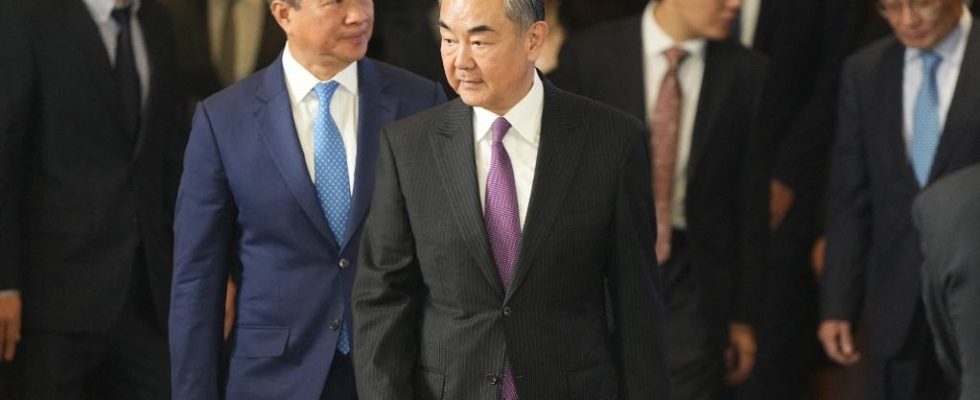THE Chinese Foreign Minister Wang Yi is on a crucial visit to the United States. It will be received Thursday afternoon by US Secretary of State Antony Blinken for a bilateral meeting followed by a working dinner, according to the State Department. On Friday, he will meet again with Antony Blinken and then travel to the White House to speak with national security adviser Jake Sullivan and probably President Joe Biden himself.
An invitation from the Chinese president in the pipeline?
No meeting with the American president has been announced but diplomats expect such a favor, in return for the fact that Anthony Blinken was received by President Xi during his visit to Beijing last June.
The two great rival powers engage in fierce and assertive competition, and assure that they want to manage their relationship “responsibly”. “We will compete with China in every way possible within international rules – political, economic and others. But I’m not looking for conflict,” Joe Biden said on Wednesday alongside Australian Prime Minister Anthony Albanese, who himself is due to go to Beijing soon.
Biden asks for an additional 7.4 billion to stand up to China
The American president is asking Congress for an additional budget of 7.4 billion to stand up to China, militarily and economically. For its part, China said it hoped that these meetings could put relations with the United States back on “the right path”. For Washington, this will be an opportunity to encourage Beijing to have “a more constructive approach”, according to a senior American official on condition of anonymity.
The Sino-Russian rapprochement, the war in Ukraine and, above all, that between Israel and the Palestinian Islamist movement Hamas should also feature in the discussions, at a time when the international community is worried about an escalation of the conflict.
Wang Yi’s visit should prepare for Xi Jinping’s visit to the United States, possibly on the sidelines of the next summit of the countries of theApec (Asia-Pacific Economic Cooperation)) in San Francisco in mid-November.
Beijing cautious
Joe Biden has repeatedly expressed his “hope” for a next meeting before the end of the year, while their last face-to-face meeting dates back to the G20 summit in Bali in November 2022.
But according to Robert Daly, expert at the Wilson Center, China first wants to ensure that the Biden administration will not seek to “embarrass” the Chinese president if he comes. More generally, the Chinese consider that “stabilization of the relationship means that the United States stops the incessant flow of provocations” and lets “China concentrate on its internal economy” which is showing signs of weakness, adds the expert. .
Receiving a delegation of American senators recently, the Chinese president spoke of a decisive relationship for “the future of humanity”.
Many areas of friction
There are many areas of friction. The question of Taiwan, which Beijing claims as part of its territory, is notably one of them.
China’s Defense Ministry on Thursday accused Taiwan’s Democratic Progressive Party (DPP) of pushing the island towards a “dangerous war situation”, following reports that Taipei plans to buy thousands of military drones.
The United States also condemns Beijing’s activities in the South China Sea, including the latest incident on Monday involving Chinese ships colliding with Philippine boats near an atoll, according to Manila.
“Any attack on aircraft, ships or the armed forces of the Philippines will have the effect of activating our mutual defense partnership,” Joe Biden warned on Wednesday.
“No, we are not surrounding China”
The United States, for whom China represents its main long-term strategic challenge, fears Beijing’s expansionist aims. In response, Washington highlights the strengthening of its alliances in Asia, with India, Japan, South Korea and the Pacific Islands. Beijing sees this as a desire to “encircle” China.
“No, we are not encircling China,” said Joe Biden, while adding “that no country should unilaterally change the rules of the game in terms of international or maritime airspace.”

